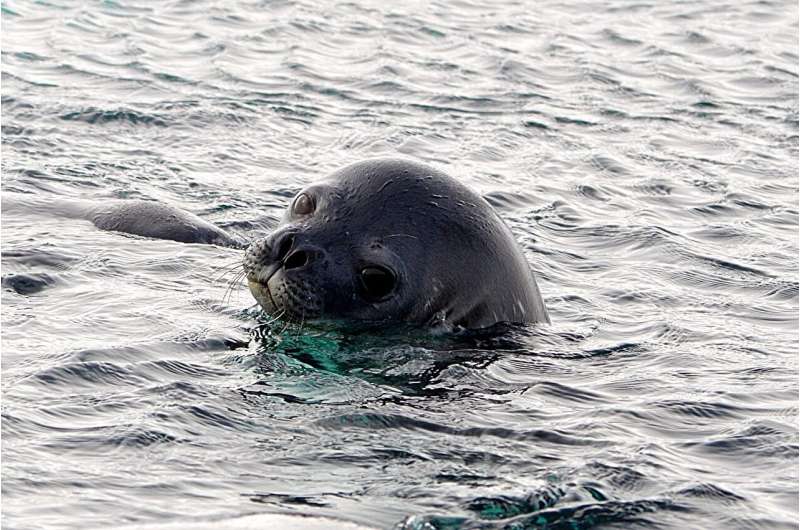This week, researchers reported the world’s second-tiniest toad, winning the silver in the Brachycephalus contest. Chemists at UCLA disproved a 100-year-old organic chemistry rule. And researchers in Kenya report that elephants don’t like bees, which could be a conservation boon (for the elephants. And maybe also the bees?). Additionally, scientists addressed an old thought experiment about monkeys and the theater, physicists correlated dark energy with the black hole population in the universe, and a group of Antarctic seals were found to be highly strategic and also adorable:
Monkey not working hard enough
If an infinite number of monkeys pecked away at typewriters for an infinite span of time, they would eventually produce the works of Shakespeare. Just plugging the word “infinite” into a theorem provides a lot of headroom for affirmative statements, it’s great. But researchers at the University of Technology in Sydney, Australia, report that a single monkey typing from now until the heat death of the universe would never accidentally produce any of the works of Shakespeare. At this point, a literary troublemaker might suggest that Christopher Marlowe was able to produce all the works of Shakespeare in one man’s lifetime, a feat not even Shakespeare could accomplish. But I am not here to cause trouble.
The constraints the researchers imposed on the thought experiment include a keyboard with 30 keys that includes the English language alphabet and common punctuation marks and assumed a typing speed of one key per second. They conclude that there’s a 5% chance that a single monkey could accidentally type the word “bananas” in its own lifetime.
But even when they included calculations for the entire world population of chimpanzees—around 200,000—they found zero chance that any of them would ever type “Cry ‘Havoc!’ and let slip the dogs of war, that this foul deed shall smell above the earth, with carrion men, groaning for burial” (“Julius Caesar,” Christopher Marlowe, 1564–1593.)
The authors of the study conclude, “It is not plausible that, even with improved typing speeds or an increase in chimpanzee populations, monkey labor will ever be a viable tool for developing non-trivial written works.”
Phenomena correlated
The name “dark energy” basically translates in the language of physics to “we don’t know what this is.” It represents an observable force that scientists can measure but can’t explain: the energy that drives universal expansion. One of its most unexplainable features is that it accelerates over time. It’s related to the unknown energy that drove the original exponential expansion of the universe.
At the singularity of a black hole, gravitational conditions are identical to the universe in the instants after the Big Bang, with an unimaginable density of gravity. So physicists have theorized for years about whether black holes represent miniature Big Bangs running backward, cosmic inflation in reverse. Researchers at the University of Michigan used data from the Dark Energy Spectroscopic Instrument to explore this scenario.
The idea is that if black holes contain dark energy, they can couple to the expanding universe and cause its growth to accelerate; still-incomplete DESI data indicates that dark energy density has increased over time. By comparing this data to the number of black holes created by the deaths of stars over the lifetime of the universe, the researchers found that the two phenomena were consistent—the amount of dark energy and the creation of new black holes increased in the right way.
Co-author Steve Ahlen, professor emeritus of physics at Boston University, says, “When I first got involved with the project, I was very skeptical. But I maintained an open mind throughout the entire process and when we started doing the cosmology calculations, I said, ‘Well, this is a really nice mechanism for making dark energy.'”
Seals cute, strategic
Weddell seals are the world’s southernmost mammals, and among the cutest, dwelling in the Antarctic and spending nearly all of their time underwater, foraging. They’re capable of stupendously deep dives of up to 900 meters, spending upward of 90 minutes in the deep sea, which is far above their aerobic threshold; afterward, they require more recuperation time than after a more casual dive. Researchers now report in a new study that Weddell seals are quite strategic about their time allocation.
In the study, they fitted 59 adult seals with conductivity temperature depth-satellite relay dive loggers to collect behavioral data over 8,913 days. They expected to find that the seals made their deepest dives at midday when light penetration into the water was highest. But expectations are made to be subverted, as anyone who has seen the works of M. Night Shyamalan knows.
What they found was that the seals only make their deepest dives early in the day in order to recuperate before midday, when the sun is overhead and prey easier to find at shallower depths—the seals would miss out on easy meals if they were lying around recovering from deep dives all day.
© 2024 Science X Network
Citation:
Saturday Citations: On chimpanzee playwrights; the nature of dark energy; deep-diving Antarctic seals (2024, November 2)
retrieved 2 November 2024
from https://phys.org/news/2024-11-saturday-citations-chimpanzee-playwrights-nature.html
This document is subject to copyright. Apart from any fair dealing for the purpose of private study or research, no
part may be reproduced without the written permission. The content is provided for information purposes only.

